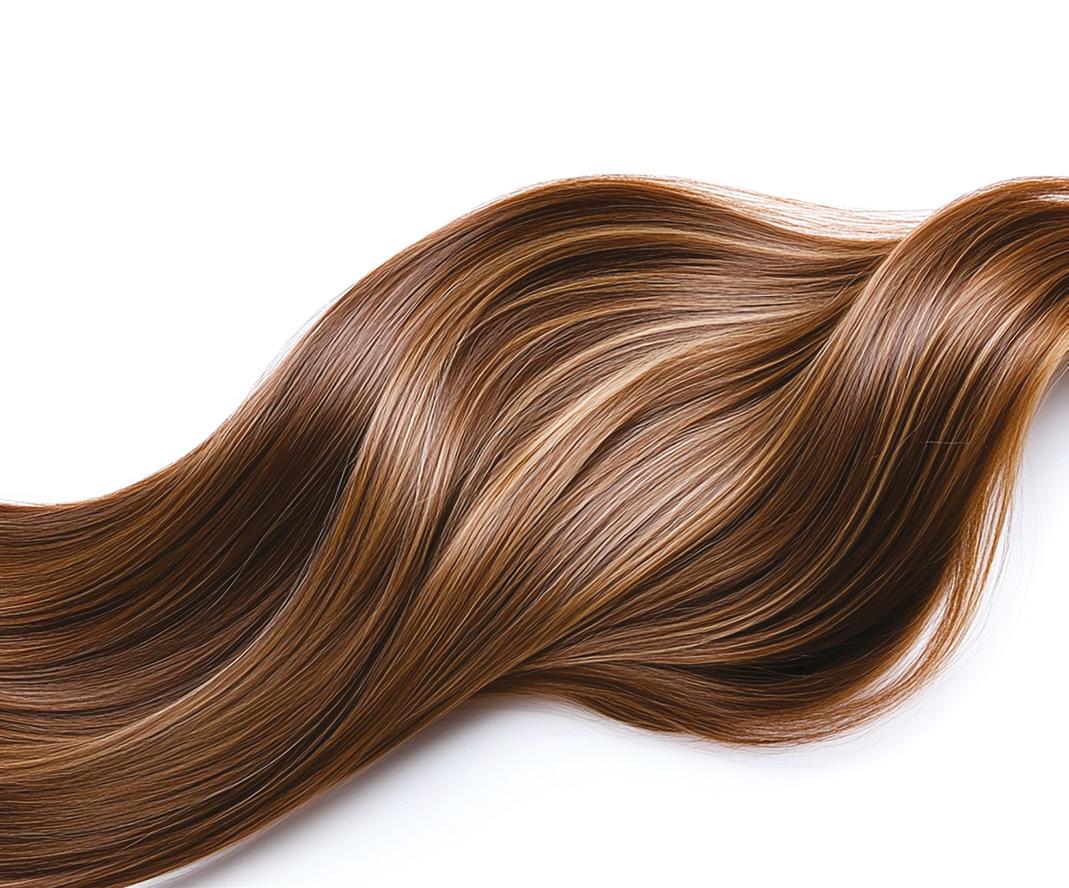
5 minute read
Nature’s Best?
Free from potentially harmful chemicals and formulated to support healthy hair and scalp, the rise in ‘clean’ hair care is making waves in the salon environment.
Innovative and creative, hair care formulations are forever evolving. With ingredient transparency and sustainability increasingly important to consumers, professional brands are using nature-based extracts and science-backed evidence in synergy to create ‘clean’ shampoos, conditioners and styling products free of synthetic ingredients.
“Natural hair care is more than a movement, it’s a mindset,” says Gem Schwartz, founder of Taylor Rose Hair (www.taylorrosehairandbeauty.com). “Clean, effective and science-backed options are reshaping the beauty landscape, proving that you don’t need harsh chemicals to get healthy, gorgeous hair. With education, intentional product choices, and a commitment to transparency, professionals and clients can grow together – rooted in care, powered by nature.”
“For many clients, switching to clean hair care is more than a trend, it’s part of a broader lifestyle change toward wellness, sustainability and ingredient-conscious living. But professionals play a crucial role in guiding that journey,” explains Melissa Timperley, hair stylist and founder of Melissa Salons (www.melissa-salons.com).
“Ingredients like plant extracts, coconut oil and essential oils not only nourish the hair but also promote scalp health, making these products effective choices,” suggests Olivia Jones, manager and hairdresser at MacleodBradley (www.macleodbradley.co.uk).
“While traditional products have been favoured for their immediate performance, emerging studies and consumer feedback suggest that these natural options can be just as effective when formulated correctly. They provide the added benefit of being free from potentially harmful chemicals, appealing to the growing market of health-conscious consumers.”
Gem Schwartz continues:
“Clean haircare is all about removing ingredients that can cause harm to the hair, scalp, or even long-term health. It’s less about whether something is “natural” and more about whether it’s non-toxic and necessary.
“For me clean means products that are free from sulfates [sic], parabens, silicones, synthetic fragrance, phthalates and formaldehyde-releasing preservatives. These ingredients are often included for texture, foam or shelf life, but they can actually strip the scalp, cause build-up, disrupt hormones (which is a major bigee) or trigger irritation.
“I’m far more interested in what’s left in the formula and whether it actually supports long term hair health. More and more people are becoming aware of what is actually in our products and rightly so.”
“A significant development in silicone-free shampoos and conditioners is the rise of gentle, plant-derived cleansing agents like decyl glucoside and cocoglucoside,” says Dr Nora Albaldawi, Principal Dentist at Skintique Beautiful Smiles (www.beautifulsmiles.co.uk) and expert in hair restoration.
“These natural surfactants effectively remove dirt and oil without stripping the hair’s natural moisture, which can happen with harsher synthetic detergents. They’re kinder to both the scalp and hair, making them ideal for sensitive skin and frequent washing. While they may create less foam than traditional products, their mild yet thorough cleansing helps maintain healthy hair over time, aligning perfectly with consumers’ demand for sustainable and skin-friendly beauty options.”
Gem Schwartz adds:
“Aloe vera is one of my favourites due to it calming the scalp and helping soothe inflammation. Jojoba and argan oils mimic the scalp’s natural oils, which makes them incredibly effective without being heavy. Shea butter, rice proteins and apple cider vinegar are also great alternatives for moisture, strength and shine without leaving residue behind.
“When used in properly formulated products, these ingredients support the scalp’s natural microbiome, help with manageability and leave the hair feeling genuinely healthy rather than artificially smooth.”
In addition, Melissa Timperley recommends Argan Oil, rich in antioxidants and essential fatty acids (“it’s a hero for shine and softness without buildup,” Melissa says), antibacterial and antifungal tea tree oil, ideal for dandruffprone scalps, plus deep moisturising shea butter especially beneficial for textured and curly hair.
Clean brands rival traditional formulas
“The key lies in proper formulation,” Melissa explains. “When crafted correctly, natural emulsifiers, surfactants, and preservatives can match the efficacy of their synthetic versions. Clean products may behave a little differently (less lather, for instance), but with time, many professionals find they offer better long-term hair and scalp health.”
“Thanks to innovation in green chemistry, clean brands are now formulating products that rival traditional professional lines in performance,” says Melissa. “Brands [such as] Davines, Authentic Beauty Concept and Oway have developed shampoos, conditioners, and styling aids that deliver salon- worthy results – without compromising ingredient integrity.”
Gem agrees:
“We’re well past the days of having to choose between performance and purity. Some of the most innovative brands in the professional space are formulating clean products with incredible results especially in styling and scalp care.
“Once hair is no longer coated in heavy silicones or drying alcohols, you start to see the real texture and potential of the hair. Colour lasts longer, styles hold better and the scalp responds beautifully. It may take a short transition period, but the long-term results are undeniable.”
Melissa Timperley, celebrity hair stylist and founder of Melissa Salons (www.melissa-salons.com), shares ingredients she would avoid in a clean hair routine…
• Sulphates (like SLS/SLES): These foaming agents are what cause shampoo to lather up but can strip the scalp’s natural oils, leading to dryness and irritation.
• Parabens: Used as preservatives, parabens have raised concerns due to their potential hormone-disrupting effects.
• Silicones: Though they add temporary shine, silicones can build up over time and block moisture from penetrating the hair shaft.
• Phthalates & Synthetic Fragrances: These are often linked to allergic reactions and may contain undisclosed, potentially harmful compounds.
• Formaldehyde-releasing agents: Still found in some hair straightening treatments, formaldehyde is a known carcinogen.








